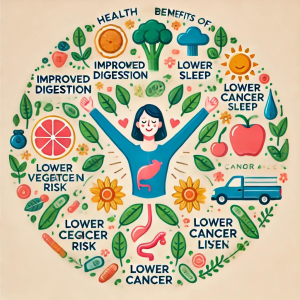By: Dr. Emily Grace , aromatherapist and holistic sexuality specialist

Choosing to become a vegetarian extends far beyond simply altering your diet; it’s a lifestyle choice that impacts various aspects of your life beyond just what you consume. The journey from considering vegetarianism to fully adopting the lifestyle can take weeks or even months. This transition should not be rushed, as it involves physical, spiritual, moral, and emotional changes.
Adopting a meat-free lifestyle requires new meal planning strategies, recipes, and shopping habits. This process can be especially challenging if you live with people who are not vegetarians. If you are responsible for meal planning, you might need to prepare separate meals, or if someone else cooks, accommodations must be made to ensure you have a vegetarian option.

Adjusting to a vegetarian lifestyle in a predominantly meat-eating world is a significant change. Initially, you might experience cravings for meat. It can be beneficial to gradually ease into vegetarianism, allowing your body to adapt to a reduced intake of meat while finding alternative sources of nutrients and vitamins. This gradual transition can help prevent feelings of deprivation or nutritional deficiencies.
For many, adopting a vegetarian lifestyle is part of a broader life transformation that might include yoga, meditation, or other spiritual practices. If your motivation for becoming a vegetarian is health-related, the transition might be simpler. However, if your decision is driven by moral, ethical, or spiritual reasons, it likely reflects a deeper spiritual journey.
One of the most rewarding aspects of becoming a vegetarian is joining a large and supportive community. The vegetarian community welcomes new members warmly and offers a wealth of support and resources. Even those who are not vegetarians often support and respect your lifestyle change.

Contents
Little-Known Benefits of Vegetarianism
Many people who are unfamiliar with the vegetarian lifestyle mistakenly believe it must be dull and restrictive. However, the reality is quite the opposite. Vegetarians are not focused on what they are giving up but rather on what they are gaining—a healthier lifestyle in harmony with their bodies and the environment.

There are numerous benefits and “secrets” of vegetarianism that are not widely known. These include:
- Vegetarians often experience lower rates of depression as they know natural ways to combat it.
- They tend to have fewer weight issues compared to meat-eaters.
- Vegetarians are generally more knowledgeable about nutrition and make the most of their diets.
- They often sleep better, have more energy, and need less sleep.
- Vegetarians have lower incidences of cancer, heart disease, and digestive disorders.
- They typically live longer than meat-eaters.
One lesser-known fact about vegetarians is the power of walnuts. Walnuts contain serotonin, a potent natural antidepressant. Instead of relying on prescription antidepressants, you can enjoy a cup of tea with half a walnut shell, which can significantly improve your mood.
Another secret is the importance of using higher-fat salad dressings to absorb the carotenoids in vegetables effectively. While diet trends suggest using low-fat dressings, vegetarians understand that higher-fat dressings can enhance nutrient absorption.
Green tea is another staple in the vegetarian diet, known for its digestive benefits, mood-enhancing properties, and weight loss support. These health secrets have been known in ancient civilizations and are now embraced by vegetarians.

One of the biggest challenges of becoming a vegetarian is managing relationships with family, friends, and colleagues who are not vegetarians. When you share your decision, their reactions might range from confusion to concern. It’s important to communicate your reasons clearly and reassure them that your dietary choice is primarily health-related, which can ease their concerns.

For those with moral or spiritual reasons for vegetarianism, open communication is crucial. It’s essential to express your beliefs without making others feel uncomfortable. Patience is key. As your loved ones see your commitment, they may become more accepting and even interested in your lifestyle.

Managing Meat Cravings
It’s normal to miss the taste of meat, especially when you first become a vegetarian. Don’t feel guilty about these cravings. Many of us were raised eating meat, and it takes time to adjust. Fortunately, there are many meat substitutes and delicious vegetarian recipes available.
Tofu is a popular meat substitute made from soybeans. It’s rich in protein and can be used in a variety of dishes, mimicking the texture and flavor of meat. It’s versatile and can be grilled, baked, or used in sauces.
Soy milk and Tofutti (vegan cheese) are excellent substitutes for dairy products, offering similar flavors without the animal-based ingredients. Tofu can also be used in traditional egg dishes like quiches, omelets, and custards, making it a great replacement in vegetarian recipes.
Tempeh, made from fermented soybeans, is another excellent meat substitute. It can be braised, fried, and used in a variety of dishes. Exploring these alternatives can make the transition to a vegetarian lifestyle enjoyable and satisfying.

Benefits of Vegetarianism
One of the significant advantages of a vegetarian lifestyle is cost savings. Meat is often more expensive than vegetables, so your food costs can decrease significantly. Additionally, vegetarians often experience improved digestion, better sleep, and enhanced overall health. Many chronic health issues, such as obesity, cancer, and heart disease, are linked to meat consumption. By eliminating meat, you can reduce your risk of these conditions.
The moral, ethical, and spiritual reasons for vegetarianism are also compelling. Many religions advocate for a meat-free diet, and a vegetarian lifestyle aligns with ethical treatment of animals. By choosing vegetarianism, you can contribute to a more humane and sustainable world.

Conclusion
The decision to become a vegetarian is a positive and rewarding lifestyle choice. It offers numerous health benefits, cost savings, and ethical advantages. Embracing vegetarianism doesn’t require a drastic change or joining a specific community. It’s a personal journey that can be gradually adopted, allowing you to enjoy a healthier, more conscious way of living.
As you explore vegetarianism, you’ll discover a diverse community and a wealth of resources to support your journey. Whether you start slowly or dive in fully, the benefits of a vegetarian lifestyle are plentiful and enduring.
Dr. Emily Grace is a certified aromatherapist and holistic sexuality specialist with a Ph.D. in Alternative Medicine. With over 15 years of experience, she specializes in using essential oils to promote sexual wellness and enhance intimacy. Dr. Grace conducts workshops and private sessions that integrate aromatherapy with sexual health practices, helping individuals and couples create a more intimate and harmonious relationship. Her approach combines the therapeutic properties of essential oils with modern sexuality counseling to foster overall well-being.


